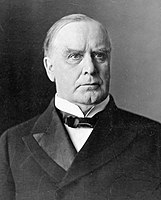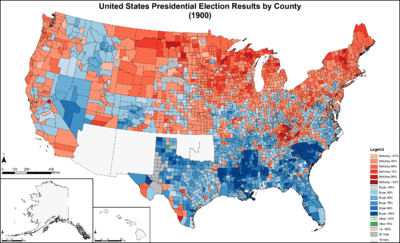1900 United States presidential election
As Vice President Garret Hobart had died in 1899, the Republican convention chose New York Governor Theodore Roosevelt as McKinley's running mate.
Roosevelt's efforts to reform New York politics – including Republican politics – led Platt and other state Republican leaders to pressure President McKinley to accept Roosevelt as his new vice presidential candidate, thus filling the spot left open when Vice President Garret Hobart died in 1899.
Although Roosevelt was reluctant to accept the nomination for vice president, which he regarded as a relatively trivial and powerless office, his great popularity among most Republican delegates led McKinley to pick him as his new running mate.
[9][10] As early as three days into his candidacy, his campaign having been damaged by the aforementioned missteps, rumors abounded regarding Dewey's impending withdrawal which proved false.
[11] Further injuries were made, however, when it became clear that the Democratic Party leaders of Vermont, Dewey's home state, were hostile to him and wholly committed to Bryan.
[14] Dewey recognized soon afterward that he had very little chance of gathering enough delegates from Western and Southern states to keep Bryan from attaining a two-thirds majority at the convention, publicly commenting on May 17 that he no longer knew why he had even run for president at all.
In several southern states, however, the legislatures were still controlled by the Democrats, and they began passing a series of laws to eliminate the franchise for black voters with the intention of undermining a significant bloc of Populist support.
The move had its intended consequences; in the 1898 mid-term election, Populist representation in the House of Representatives fell to 9, its lowest level since the party was founded.
On May 17, 1899, Populist leaders met in St. Louis and issued an address calling for a "Middle of the Road" policy in which the party would decline future fusion efforts.
The "Fusion" Populist National Convention assembled in a large tent just west of Sioux Falls, South Dakota on May 9 and unanimously nominated Bryan for the presidency.
Charles Towne, the leader of the Silver Republican Party, was almost unanimously nominated as his running mate, facing only weak opposition from Representative John Lentz from Ohio.
Meeting in Cincinnati, Ohio, the "Middle of the Road" faction adopted a platform that called for the creation of fiat money, government ownership of key industries and the opening of conservation lands for economic development.
The American Anti-Imperialist League had been formed in 1898 in opposition to the acquisition of the Philippine Islands, considering its annexation violating the concept of "consent of the governed".
While not formalized as a political party, there existed a movement within the League that sought to nominate an independent ticket to run solely on the platform of anti-imperialism or, barring that, to endorse whichever Republican or Democratic presidential nominee that was themselves anti-imperialist.
Later that same month a call was made for a National Convention to meet in Indianapolis on August 15 with the intention of either endorsing or nominating a ticket for the general election.
Then discussed names for possible presidential candidates were former Speaker Thomas Reed, former Secretary of State Richard Olney, former Massachusetts Governor George Boutwell, and former Senator John Henderson From the beginning the headwinds were in Bryan's favor, with permanent President George Boutwell addressing the convention and calling for the endorsement of the Democratic ticket, this followed in speeches by former General John Beatty, Edgar Bancroft, and Gamaliel Bradford.
The resolution to endorse Bryan however was subject to prolonged debate, its principal opponents being representatives of the "third-ticket" movement led by Thomas Osborne.
A statement was then released by the attending League delegates from New York, denouncing both the Republican and Democratic parties, advocating for the independence of the Philippines and Porto Rico [sic], supporting gold standard and a sound banking system, calling for the abolition of special privileges, and demanding a public service based on merit exclusively.
Though there was some concern over whether Caffery would accept the nomination if offered, Osborne claimed that he had been communicating with Caffrey and that he was both sympathetic to the National Party and willing to be their candidate for the presidency.
The party platform was virtually identical to the one offered by the League committee back in July, though the definition of "special privileges was defined as "subsidies, bounties, undeserved pensions, or trust-busting tariffs."
A strategy was also adopted where, in those States where it was impractical to nominate a full slate of electors, a single elector would be nominated instead, allowing for voters to vote the Nationalist ticket as well as one other of their choice; it was hoped that this might avail concerns that the Nationalists would take votes away from either Bryan or McKinley, depending on the voters' sympathies.
Unfortunately for the Nationalist Party Senator Cafferty declined the nomination some weeks later, resulting in a scramble where Arthur Briggs Farquhar, owner of the Pennsylvania Agricultural Works, was considered as a possible replacement.
The economy was booming in 1900, so the Republican slogan of "Four More Years of the Full Dinner Pail," combined with victory in the brief Spanish–American War in 1898, had a powerful electoral appeal.
Roosevelt proved highly energetic, and an equal match for William Jennings Bryan's famous barnstorming style of campaigning.
[52] In his speeches, he repeatedly argued that the war had been just and had liberated the Cubans and Filipinos from Spanish tyranny:[53] Four years ago the nation was uneasy because at our very doors an American island was writhing in hideous agony under a worse than medieval despotism.
The situation in Cuba had become such that we could no longer stand quiet and retain one shred of self-respect.... We drew the sword and waged the most righteous and brilliantly successful foreign war that this generation has seen.
[56] General Arthur MacArthur, Jr., had been in command of the Philippines for four months, warning Washington that the war was not lessening and that the end was not even in sight.
MacArthur wrote: The success of this unique system of war depends upon almost complete unity of action of the entire native population.
Intimidation has undoubtedly accomplished much to this end, but fear as the only motive is hardly sufficient to account for the united and apparently spontaneous action of several millions of people.
It is more probable that the adhesive principle comes from ethological homogeneity, which induces men to respond for a time to the appeals of consanguineous leadership even when such action is opposed to their interests and convictions of expediency.





























